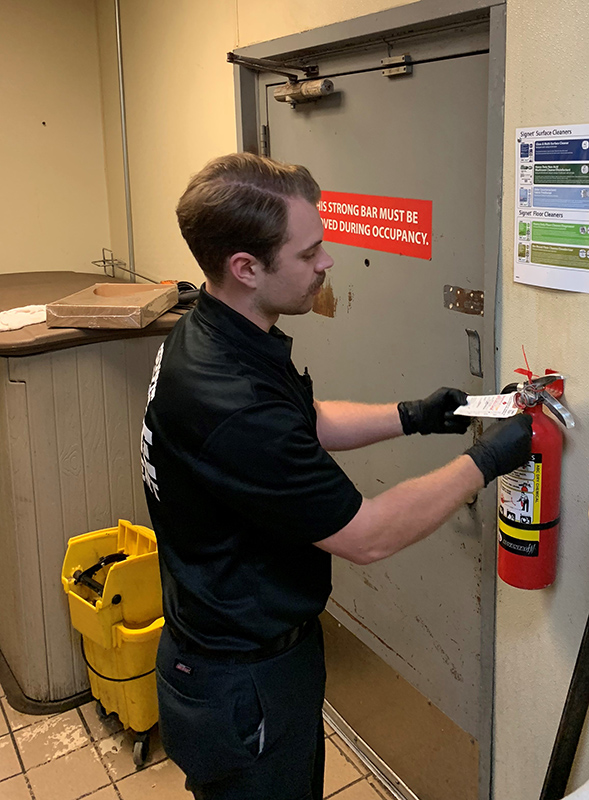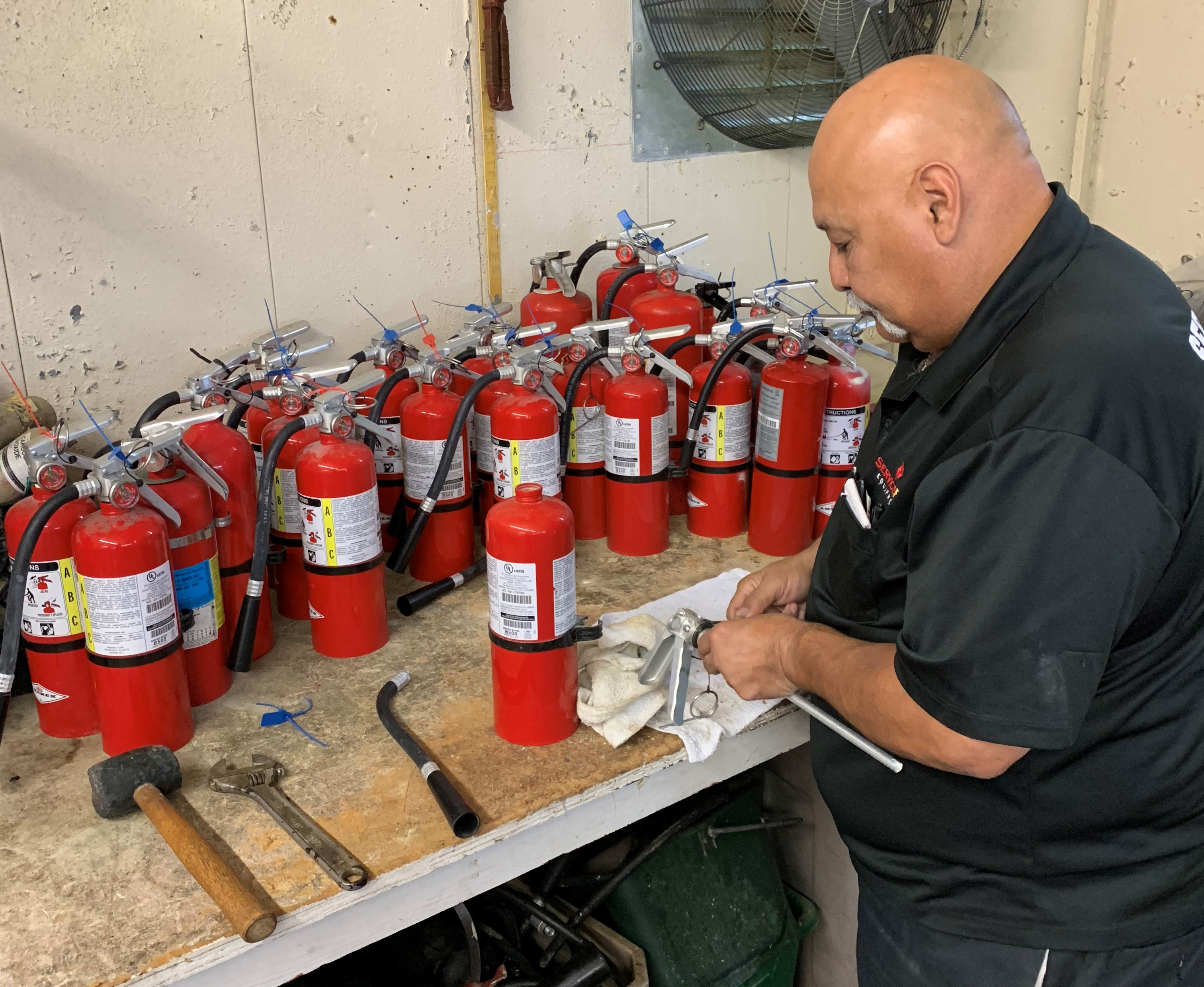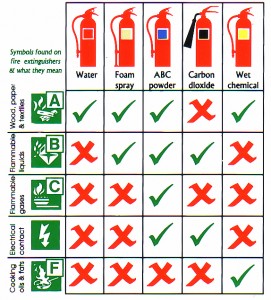Fire Extinguisher Inspections, Sales & Service
Inspections & Testing | Recharge | Refill | Maintenance | Sales
Fire Extinguisher Inspections and Testing
 Fire extinguisher inspections include two main areas:
Fire extinguisher inspections include two main areas:
- A safety and performance check
- A certified inspection by a licensed fire protection specialist
If you are in the Greater Dallas area, fire extinguisher inspections and recertifications must be done by a certified specialist.
How often should I get my fire extinguishers inspected?
While a thorough annual certified fire extinguisher inspection is needed, for safety and equipment reliability, a regular inspection program should be implemented as well. Whether your program is weekly or monthly, the inspection should be performed on the same day of each period.
How should I prepare for my fire extinguisher inspection?
When an inspection is performed, a checklist should be used so any areas of concern or areas that needs special attention can be noted.
What are the main areas of concern during a fire extinguisher inspections?
- Mechanical Parts – does everything pass a visual inspection?
- Extinguishing Agent – is the gauge needle in the green zone?
- Pressure – is the cylinder safe and effective for use?
What should I look for when checking my fire extinguishers?
Key areas of concern include:
- making sure that the nozzle and parts are not blocked with any object or other obstructions, which may hinder performance
- examining for rust, leaks, dents or chemicals accumulated on the unit
- checking the hose to make sure it doesn’t have any cuts or excessive wear indicating it could be blocked.
- making sure the operating instructions are legible as many people have never used a fire extinguisher and could panic if instructions are not accessible
- making sure the pressure gauge is at the correct level typically indicated by checking if the gauge needle is in the green zone. If it isn’t, then it is time to recharge your fire extinguisher.
How do I know if my fire extinguisher is still good?
Fire extinguishers are only effective if its expelling means is up to specifications. A pressure test should be performed by a certified fire protection contractor to make sure it is perfectly safe for use. If it isn’t, then you will need to purchase a new fire extinguisher.
Fire Extinguisher Recharge
Any time a fire extinguisher has been used a refill should be performed to ensure that it will work at its peak efficiency the next time it is needed. A fire extinguisher recharge is more than just simply refilling it, so trust the experts at Service Fire Equipment to handle all of your recharge and maintenance needs.
Any time you operate a fire extinguisher, you have changed the pressure in the device and therefore a thorough fire extinguisher inspection needs to be performed as part of the recharge process.
Fire Extinguisher Refill
The first step is to clean the external tank, the nozzle, and all operational parts. Next we need to preform a leak test before we do anything else. A simple test for checking for leaks is to submerge the whole extinguisher in water to see if any bubbles appear indicating a leak. Finally, we need to check for wear and tear, brittle o-rings, and any kind of a clogging issue that could impact a successful recharge.
At this point we are ready to refill the device with the correct extinguishing agent. The class of fire extinguisher determines if it will be refilled with water or a powder agent. After the unit has been refilled, it must be pressure tested for any leaks to ensure the unit will work properly.
Fire Extinguisher Maintenance
 A visual inspection alone cannot insure that a portable fire extinguisher is safe or will operate properly when needed. Over time, normal handling or workplace conditions can impact the structural integrity of the extinguisher and cause it to malfunction or burst. To prevent this from happening, portable fire extinguishers are required to have six-year maintenance, as well as hydrostatic tests.
A visual inspection alone cannot insure that a portable fire extinguisher is safe or will operate properly when needed. Over time, normal handling or workplace conditions can impact the structural integrity of the extinguisher and cause it to malfunction or burst. To prevent this from happening, portable fire extinguishers are required to have six-year maintenance, as well as hydrostatic tests.
- Six-Year Maintenance – Every 6 years, stored-pressure fire extinguishers that require 12-year hydrostatic tests should be emptied and subjected to the applicable internal and external examination procedures detailed in the manufacturer’s service manual [NFPA 10(18) Sec. 7.3.6].
- Hydrostatic Test - All portable fire extinguishers are required to be inspected and pressure tested by a qualified individual using the proper equipment and facilities. Hydrostatic testing is the method used to pressure test an extinguisher's critical components (cylinder, shell, hose assembly, etc.) for leaks and structural flaws by pressurizing them with a liquid. [Osha 1910.157(f)(1)] Most dry chemical fire extinguishers require this to be done every 12 years.
Fire Extinguisher Sales
We sell some of the best brands of fire extinguishers. You can never have too many fire extinguishers for your home or business. If a fire breaks out, having a nearby fire extinguisher can potentially prevent disaster.
What are the different kinds of fire extinguishers?
T here are many different kinds of agents used such as water, dry-powder, foam, carbon dioxide, and wet chemicals. Fire extinguishers are labeled with alphabetical codes to enable users to choose the right model based on the flame type or size.
here are many different kinds of agents used such as water, dry-powder, foam, carbon dioxide, and wet chemicals. Fire extinguishers are labeled with alphabetical codes to enable users to choose the right model based on the flame type or size.
When buying a fire extinguisher, first look into the coding system used to classify various types of canisters. The alphabetical codes relate to the type of protection for which the fire extinguisher is
designed.
- Class A extinguishers help to douse flames fueled by wood, rubber, cloth, plastic, etc.
- Class B is ideal for flammable liquids that include grease, oil and gasoline.
- Class C is appropriate for appliance, wiring, and electrical fires.
- Class D is perfect for combustion metals like sodium, potassium magnesium, etc.
- Class F is for burnable cooking media.
The other major factor is to opt for units that can be secured in easily accessible places. In addition, it is important to select a model that has clear usage instructions as well as provide effortless access to the trigger.
What do I need to know about buying fire extinguishers for my business?
When purchasing a fire extinguisher for your business you can't just pick one up from the local hardware store. There are city and county codes in Greater Dallas that regulate the types of units you should purchase and have on hand. Additionally, there can be a couple of other layers of complication such as insurance requirements and reliability issues with certain types.